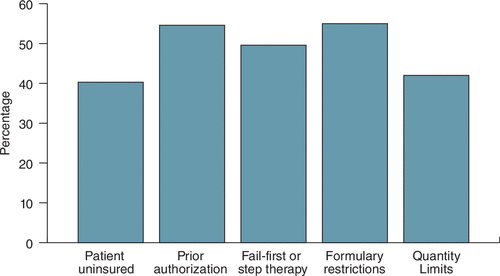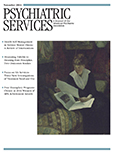Datapoints: Psychiatrists’ Perceptions of Insurance-Related Medication Access Barriers
In early 2014, the Centers for Medicare and Medicaid Services rolled back its proposed rule to limit patients’ access to psychotropic medications in Medicare Part D. However, many states continue to impose medication access restrictions in their Medicaid programs, such as prior authorization, preferred drug lists, limitations on the number of prescriptions, and fail-first requirements. Few studies have documented psychiatrists’ perceptions of how these policies present barriers to effective care and how they affect patient outcomes. This analysis sought to understand how psychiatrists in community mental health centers (CMHCs) perceive barriers to accessing medications for their patients.
From June to August 2013, e-mails were sent to psychiatrists practicing in sites affiliated with the National Council for Behavioral Health asking them to participate in an online survey administered by the National Council and the National Alliance on Mental Illness. A convenience sample of psychiatrists was obtained: 435 surveys were returned, and 55% (N=238) met inclusion criteria (actively practicing psychiatry and with knowledge of their organization’s clinical programs). Respondents were surveyed about barriers to providing psychiatric care, access to medications, and adequacy of patients’ health plans.
As shown in Figure 1, the most frequently cited barriers (as defined by “often” and “always” responses) in accessing medications for patients were formulary restrictions (55% of respondents), prior authorization (55%), and fail-first or step therapy protocols (50%). More than one-third of psychiatrists reported spending between 11% and 20% of their time handling tasks related to prior authorization. Most psychiatrists strongly agreed that it is important to be able to select among multiple psychiatric medications to manage patients’ illnesses (66%), that available medications have various levels of tolerability (64%), and that they may need to try multiple drugs to find the best fit for patients (61%).

Figure 1 Percentage of psychiatrists in CMHCs who reported frequently encountering five barriers to accessing medications
Many psychiatrists in CMHCs reported significant barriers in access to medications that limit the ability to provide effective treatment. It is important to better understand how the perceived barriers may affect outcomes under health care reform. Continued work on reform that addresses medication access policies is needed to remove barriers.



